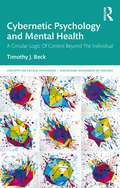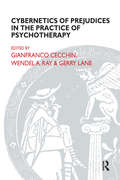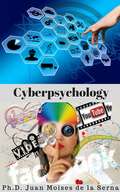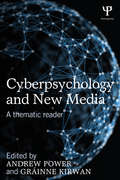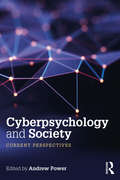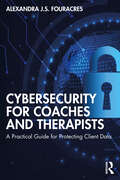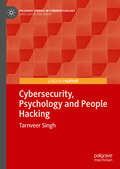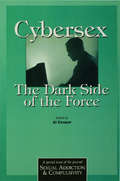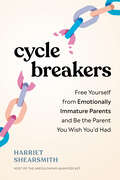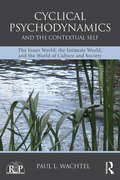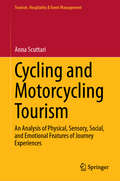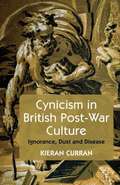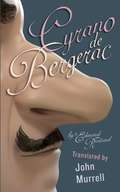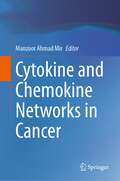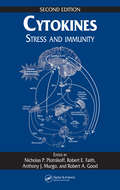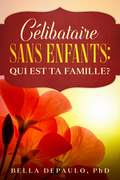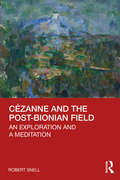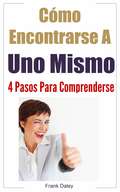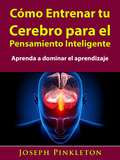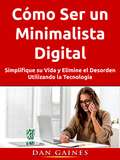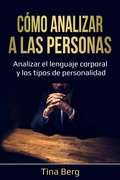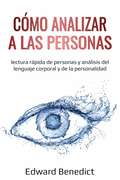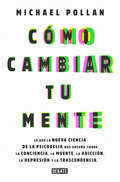- Table View
- List View
Cybernetic Psychology and Mental Health: A Circular Logic Of Control Beyond The Individual (Concepts for Critical Psychology)
by Timothy J. BeckThis book explores the cultural importance of cybernetic technologies and their relationship to human experience through a critical theoretical lens. Bringing several often-marginalized histories of cybernetics, psychology, and mental health into dialogue with one another, Beck questions common assumptions about human life such as that our minds operate as information processing machines and our neurons communicate with one another. Rather than suggest that such ideas are either right or wrong, however, this book analyzes how and why we have come to frame questions about ourselves in these ways, as if our brains were our own personal computers. Here, the rationality underlying information theories in psychology is followed to its logical conclusion, only to find it circles back to where it began: engineered methods of human control. After tracing a series of recent developments in this vein across fields related to mental health, Beck highlights emerging psychosocial alternatives by incorporating recent work of scholars and activists who have already begun creating collective support networks in radical ways. Their work overlaps fruitfully with ideas from those, including Gilbert Simondon and Fernand Deligny, who foresaw many of the current problems with how information theories have been coupled with psychology and mental health care. This book is fascinating reading for advanced undergraduate and postgraduate students across psychology, mental health programs, and digital media studies, and academics and researchers with a theoretical interest in the philosophy of technology. It’s also an interesting resource for professionals with a practical interest in organizing care services under the data-driven imperatives of contemporary capitalism.
Cybernetics of Prejudices in the Practice of Psychotherapy: Cybernetics Of Prejudices In The Practice Of Psychotherapy (The Systemic Thinking and Practice Series)
by Gianfranco Cecchin Gerry Lane Wendel A. RayTwo central ideas have become part of the orthodoxy of modern family therapy thinking. The first is that the therapist is part of the system he or she observes, and the second is that the therapist and family create a co-evolving reality through their interactions until now. No one has described the process by which these concepts are played out in the course of therapy. Cecchin, Lane and Ray are opening the way for a new field of enquiry in psychotherapy. In this book the authors identify the therapist's values and beliefs which they describe as prejudices, then they identify the equivalent prejudices held by the family, and finally they trace the ways a prejudice from one side affects the other and is, in turn, affected by the other. The book is a blend of theoretical discussion supported by case examples from therapy and the world at large. Readers of this book will discover values about themselves which guide their therapy but have long since been rendered to some unconscious realm: values about certainty, control, accountability and the search for understanding.
Cyberpsychology
by Juan Moises de la Serna María Alejandra CamachoIn this book has been integrated a new branch called The Cyberpsychology, in which studies how it has been produced a change with regard to technology person, to analyze as affecting the new insights for people in daily life, as well as the mental health of users. And all this is guaranteed by the most extensive bibliography about the last investigations carried out in this area. The Social Media, internet and to all these technological advances have changed the way of looking at the world in recent years, a radical change in many cases, a fact that cannot be left unnoticed to the Psychology, the science of human behavior. First, with the invention of tools such as the hatchet and the needle, and subsequently, the machines such as cars and computers, have revolutionized the ways to be connected with oneself and with others. To talk to a relative or friend, just go to the website by Skype, and that the other person is available, no matter where they are. With many technological advances that have happened over the last decades, due to which it has forced to people, within technology, to adapt to it and, in this way, to take advantage of it. Technological changes as well as the new insights affecting people in daily life, and also the mental health of users. And all this is guaranteed by the most extensive bibliography about the last investigations carried out in this area. In this book has been integrated a new branch called The Cyberpsychology, in which studies how it has been produced a change with regard to technology person, to analyze as affecting the new insights for people in daily life, as well as the mental health of users. And all this is guaranteed by the most extensive bibliography about the last investigations carried out in this area. The Social Media, internet and to all these technological advances have changed the way of looking at the world in recent years, a radical change in many cases, a fact that c
Cyberpsychology and New Media: A thematic reader
by Andrew Power Gráinne KirwanCyberpsychology is the study of human interactions with the internet, mobile computing and telephony, games consoles, virtual reality, artificial intelligence, and other contemporary electronic technologies. The field has grown substantially over the past few years and this book surveys how researchers are tackling the impact of new technology on human behaviour and how people interact with this technology. Examining topics as diverse as online dating, social networking, online communications, artificial intelligence, health-information seeking behaviour, education online, online therapies and cybercrime, Cyberpsychology and New Media book provides an in-depth overview of this burgeoning field, and allows those with little previous knowledge to gain an appreciation of the diversity of the research being undertaken in the area. Arranged thematically and structured for accessibility, Cyberpsychology and New Media will be essential reading for researchers and students in Social Psychology and Cyberpsychology, and in Communication and Media Studies.
Cyberpsychology and Society: Current Perspectives
by Andrew Dr PowerHuman interaction with technology is constantly evolving, with rapid developments in online interaction, gaming, and artificial intelligence all impacting upon and altering our behaviour. The speed of this change has led to an urgent need for a new field of study, cyberpsychology, in order to investigate the ways in which human behaviour is affected by the addition of technology, and the benefits and risks thereof. Cyberpsychology and Society does not offer a description of or justification for the field of study, but is rather a presentation of some of the most recent research in many key sub-topics within the area. Based on the work being done in the Institute of Art, Design and Technology (IADT) in Dublin, Ireland, Cyberpsychology and Society brings together a unique collection of writings by contributors on cyberpsychology in relation to health, education, gaming, consumer behaviour, and social change in an online world. The book focuses on the impact of societies’ increasing interaction with technology, and is a presentation of some of the most recent research in the area. Describing cutting-edge research while employing a tone which is accessible to both students and academic staff, this book is an invaluable resource for students, researchers and academics of cyberpsychology and related areas.
Cyberpsychology: The Study of Individuals, Society and Digital Technologies
by Monica T. Whitty Garry YoungAn important new BPS Textbook in Psychology exploring the interactions between individuals, societies, and digital technologies Outlines key theories and empirical research within cyberpsychology and provides critical assessments of this rapidly changing field Identifies areas in need of further research and ways to use digital technologies as a research tool Covers topics such as online identity, online relationships and dating, pornography, children's use of the internet, cyberbullying, online games and gambling, and deception and online crime Engaging and accessible for students at the undergraduate and graduate level with real life examples, activities, and discussion questions
Cybersecurity for Coaches and Therapists: A Practical Guide for Protecting Client Data
by Alexandra J.S. FouracresThis groundbreaking book filters down the wealth of information on cybersecurity to the most relevant and highly applicable aspects for coaches, therapists, researchers and all other practitioners handling confidential client conversations and data. Whether working with clients online or face to face, practitioners today increasingly rely on the cyberspace as part of their practice. Through a solutions-focused lens, the book provides easy-to-apply practical advice and guidelines using non-technical language, enabling practitioners to mitigate the rising threat of cybercrime, which can no longer be ignored. By the last page the reader will have knowledge and awareness towards: securing devices, spotting financial fraud, mitigating the risks of online communications, operating more securely from a home office and handling a cyber event if one occurs. Clear, concise, and easy to follow, this guide is a pivotal resource for coaches, therapists, researchers and all other practitioners protecting their clients and businesses.
Cybersecurity, Psychology and People Hacking (Palgrave Studies in Cyberpsychology)
by Tarnveer SinghThis book explores the intersection of cybersecurity and psychology, examining the motivations and behaviours of cybersecurity professionals, employees, hackers, and cybercriminals. It delves into the psychology of both cyber attackers and defenders, offering insights into their motivations. The book will explore key themes which include cognitive bias, human factors in decision-making, and the impact of threat vectors. The book features numerous case studies and interviews with hackers and whistleblowers, providing a comprehensive understanding of cybersecurity from multiple perspectives. Ideal for tech enthusiasts and psychology lovers, this book highlights the critical connection between human behaviour and digital security.
Cybersex: A Special Issue of the Journal Sexual Addiction and Compulsion
by Al CooperThis groundbreaking examination of cybersex was originally published as a special issue of the journal Sexual Addiction and Compulsivity. It is a crucial resource for sex therapists, who until now had no rigorous study of the effect of online pornography on the patients they treat. It will also be of great interest to general marriage and family therapists who find themselves dealing with this issue with their clients, as well as others who are interested in the Internet as a social phenomenon. Cybersex: The Dark Side of the Force presents for the first time an empirical foundation for the discussion of cybersex compulsivity and its effect on the mental health of individuals, couples, teens, and young children.
Cycle Breakers: Free Yourself from Emotionally Immature Parents and Be the Parent You Wish You'd Had
by Harriet ShearsmithLearn to set boundaries with a toxic parent, heal your inner child, and bring confidence into a new—healthier—version of parenting.Cycle Breakers is a personal yet relatable journey of self-discovery, healing, and growth. Part memoir and part manual, popular UK empowerment coach Harriet Shearsmith dives into the complexities of parent-child relationships, revealing how to safely and effectively challenge emotionally immature parents, redefine your identity, and create a new narrative for yourself and your family. Here, Shearsmith beautifully melds psychological insight with practical tools for how to navigate estrangement and dysfunctional family dynamics in a digital age where protecting your peace is harder than ever. Inside you will find:Relatable insights: Through candid storytelling, the author shares how to navigate complicated dynamics and transcend painful family history.Actionable guidance: Includes exercises and reflections to help you recognize unhealthy patterns and build a life aligned with your values.Empowering strategies: Learn practical tools to set boundaries, foster self-worth, and cultivate healthier relationships.A hopeful future: Discover how to let go of guilt, embrace self-compassion, and move forward with confidence into your own journey of parenting.
Cyclical Psychodynamics and the Contextual Self: The Inner World, the Intimate World, and the World of Culture and Society (Relational Perspectives Book Series)
by Paul L. WachtelCyclical Psychodynamics and the Contextual Self articulates in new ways the essential features and most recent extensions of Paul Wachtel's powerfully integrative theory of cyclical psychodynamics. Wachtel is widely regarded as the leading advocate for integrative thinking in personality theory and the theory and practice of psychotherapy. He is a contributor to cutting edge thought in the realm of relational psychoanalysis and to highlighting the ways in which the relational point of view provides especially fertile ground for integrating psychoanalytic insights with the ideas and methods of other theoretical and therapeutic orientations. In this book, Wachtel extends his integration of psychoanalytic, cognitive-behavioral, systemic, and experiential viewpoints to examine closely the nature of the inner world of subjectivity, its relation to the transactional world of daily life experiences, and the impact on both the larger social and cultural forces that both shape and are shaped by individual experience. Here, he discusses in a uniquely comprehensive fashiong the subtleties of the clinical interaction, the findings of systematic research, and the role of social, economic, and historical forces in our lives. The chapters in this book help to transcend the tunnel vision that can lead therapists of different orientations to ignore the important discoveries and innovations from competing approaches. Explicating the pervasive role of vicious circles and self-fulfilling prophecies in our lives, Cyclical Psychodynamics and the Contextual Self shows how deeply intertwined the subjective, the intersubjective, and the cultural realms are, and points to new pathways to therapeutic and social change. Both a theoretical tour de force and an immensely practical guide to clinical practice, this book will be essential reading for psychoanalysts, psychotherapists and students of human behavior of all backgrounds and theoretical orientations.
Cycling and Motorcycling Tourism: An Analysis of Physical, Sensory, Social, and Emotional Features of Journey Experiences (Tourism, Hospitality & Event Management)
by Anna ScuttariThis book explores the understanding, description, and measurement of the physical, sensory, social, and emotional features of motorcycle and bicycle journey experiences in tourism. Novel insights are presented from an original case study of these forms of tourism in the Sella Pass, a panoramic road close to the Dolomites UNESCO World Heritage Site. A comprehensive mixed-methods strategy was employed for this research, with concurrent use of quantitative and qualitative methods including documentation and secondary data analysis, mobile video ethnography, and emotion measurement. The aim was to create a holistic knowledge of the features of journey experiences and a new definition of the mobility space as a perceptual space. The book is significant in that it is among the first studies to explore the concept of journey experiences and to develop an interdisciplinary theoretical foundation of mobility spaces. It offers a comprehensive understanding and a benchmarking of the features of motorcycling and cycling journey experiences, a deeper market knowledge on motorcycling and cycling tourists, and a set of tools, techniques, and recommendations for future research on tourist experiences.
Cynicism in British Post-War Culture
by Kieran CurranThis book is the first academic text to examine cynicism as a driving force in the context of post-war British culture. It maps a sensibility that transcends divisions between high and low culture, and encompasses figures such as Philip Larkin, John Lennon and Stephen Patrick Morrissey.
Cyrano de Bergerac
by Edmond Rostand John MurrellThis beloved classic has fascinated and enchanted generations. Not since 1938 has there been a more readable or stageable prose translation. Its fast-paced plot and rich tapestry of gallant soldiers, starving poets, musketeers, marquises, and bluestockings delight, but at its heart is Cyrano: masterful soldier, accomplished poet, ferocious orator, chivalrous lover... and the possessor of an extraordinary nasal appendage!
Cytokine and Chemokine Networks in Cancer
by Manzoor Ahmad MirCytokine and Chemokine Networks in Cancer" provides a comprehensive exploration of the roles of cytokines and chemokines in cancer biology. It offers valuable insights into their diagnostic, prognostic, and therapeutic implications, making it a valuable resource for researchers, clinicians, and students interested in the field of cancer immunology and therapy. This book illustrates the importance and significance of the cytokine and chemokine signaling networks in tumor development and progression. It describes the complex networks mediated by cytokine and chemokine receptors promoting tumor cell proliferation, site-directed metastasis, and activation of angiogenic switch in tumor cells. The books also shed light on the heterogeneity of cytokines and chemokine in solid malignancies and their impact on tumor progression and therapeutic outcomes. The chapters provide current information about the types of cytokine-chemokine interactions in promoting cancer stem cell-like characteristics, epithelial to mesenchymal transition, and modulation of the tumor microenvironment. The significance of the complex interactions in cancer biology in the light of therapeutic resistance is also highlighted. The chapters also describe recent advancements in the therapeutic potential of targeting the pro-tumor cytokine and chemokine networks and limiting tumor cell metastasis. Finally, the book also provides a comprehensive yet representative description of a large number of challenges associated with targeting these vital chemokine-cytokine networks. Given its content, the book provides valuable information for researchers in the field of cancer biology and molecular medicine.
Cytokines: Stress and Immunity, Second Edition
by Tania Sih Peter A. R. ClementCytokine involvement in the immune system's response to stress is now very well documented. Cytokine activity has been implicated in a variety of mental and physical diseases, and has been shown to have a significant role in fueling the vicious circle of depression and illness.The first edition of Cytokines: Stress and Immunity pointed out
Célibataire, Sans Enfants : Qui Est Ta Famille?
by Bella DePauloCet ouvrage de la célèbre spécialiste du célibat, Bella DePaulo, regroupe plusieurs écrits, parmi lesquels des articles précédemment publiés dans les magazines Time et Quartz, une rubrique extraite d’un ouvrage scientifique, ainsi que de nouveaux écrits de l’auteure. Il représente le second tome d’une paire d’ouvrages sur les familles non traditionnelles. Alors que beaucoup pourraient être tentés de considérer les célibataires sans enfants comme n’ayant aucune famille, le Professeur Bella DePaulo, loin de tolérer ce genre de marginalisation, fournit des arguments puissants pour démontrer le rôle significatif des célibataires dans la cohésion des familles, la création de nouveaux types de familles et la recherche de modes de vie innovants.
Cézanne and the Post-Bionian Field: An Exploration and a Meditation
by Robert SnellBy inviting a ‘conversation’ between them, this book offers a nuanced introduction both to Cézanne—the ‘father of modern art’—and perhaps the most vital body of theory in contemporary psychoanalysis, ‘post-Bionian field theory’, as it has been evolving in Italy in the hands of Antonino Ferro, Giuseppe Civitarese, and others. Cézanne and Bion, each insisting on his own truths, spearheaded quite new directions in painting and in psychoanalysis. Both point us towards a crucial insight: far from being isolated, self-contained ‘subjects’, we fundamentally exist only within a larger interpersonal ‘field’. Cézanne’s painting can give us a direct experience of this. For the Italian field analysts, building on Bion’s work, the field is accessed through reverie, metaphor, and dream, which now come to occupy the heart of psychoanalysis. Here primitive ‘proto-emotions’ that link us all might be transformed—as Cézanne transformed his ‘sensations’—into aesthetic form, into feelings-linked-to-thoughts that in turn enrich and expand the field. The book draws on the words of artists (Cézanne himself, Mann), philosophers (Merleau-Ponty, Bergson), art historians and theorists (Clark, Smith, Shaw), as well as psychoanalysts (Bion, Ferro, Civitarese, and others), and it is the first to focus on one particular—and seminal—painter as a way of exploring this aesthetic and ‘field’ dimension in depth and detail. Aimed at psychoanalysts, psychotherapists, artists, art historians, and the general reader, it suggests how far art and contemporary psychoanalysis are mutually generative.
Cómo Crear Buenos Hábitos y Romper los Malos Hábitos: Guía Paso a Paso para Formar Buenos Hábitos y Romper los Malos
by Steven Polinsky¿Te encuentras participando en actividades que sabes que no son saludables para ti? ¿Sueles perder el tiempo en cosas que no importan? ¿Sabes lo que deberías estar haciendo pero de alguna manera no puedes hacerlo? ¿Eres incapaz de concentrarte? Si respondió afirmativamente a alguna de estas preguntas, esta guía puede ayudarlo a transformar su vida. ¿Le gustaría poder tener buenos hábitos, romper los malos, ser más saludable, ser más feliz, completar tareas con una mente clara? ¡Durante mucho tiempo, se han utilizado técnicas para matar malos hábitos para permitir que las personas tomen mejores decisiones en literalmente todos los aspectos de sus vidas! ¡El uso de estas técnicas también ayudará con la salud general, el presupuesto, ganar dinero, vivir bien, comer sano, tomar las mejores decisiones posibles, niveles de energía, concentración, felicidad general y mucho más! Experimenta emociones más positivas y una mejor calidad de vida al desarrollar esta habilidad esencial. ¡Presentamos los secretos que los profesionales usan para ser más efectivos que nunca! Concéntrese solo en lo que es importante y haga más cosas. ¡Con décadas de estrategias probadas, este libro electrónico le mostrará la forma más rápida y efectiva de acabar con los malos hábitos y desarrollar buenos hábitos para beneficiar su bienestar! Esta guía le enseña técnicas comprobadas sin el uso de suplementos caros, recetas o cursos. Qué está incluido: - Forma buenos hábitos. - Romper malos hábitos. - Sea más saludable y más feliz. - Tomar mejores decisiones. - Hacer mas dinero. - Tener más energía. - Reduce y elimina la ansiedad. - Tener más energía. - Haz más cosas. - Superar dolencias, obstáculos y problemas de por vida con facilidad! + MUCHO MÁS Si desea desarrollar buenos hábitos, mejorar el enfoque y el bienestar, esta guía es para usted. -> Desplácese hasta la parte superior de la pág
Cómo Encontrarse A Uno Mismo: 4 Pasos Para Comprenderse.
by Frank Daley Marcela Gutiérrez Bravo y Luis Arturo Sánchez G.Este breve libro posee cuatro pasos en el camino del Auto-Conocimiento, en la forma de cuatro preguntas. Respóndelas, toma los cuatro pasos, y te acercarás al éxito de tu vida personal, académica y profesional. Empieza por conocerte—la esencia de las más importantes cuestiones filosóficas que han encarado a la humanidad.
Cómo Entrenar tu Cerebro para el Pensamiento Inteligente: Aprenda a dominar el aprendizaje
by Hiddenstuff EntertainmentCómo entrenar tu cerebro para el pensamiento inteligente: Aprenda a dominar el aprendizaje, la cognición y el aumento del coeficiente intelectual Joseph Pinkleton ¿Le gustaría ser capaz de pensar inteligentemente con la mente clara? ¡Durante mucho tiempo, el pensamiento inteligente y las técnicas de pensamiento crítico se han utilizado para mejorar todos los aspectos de la vida de las personas! Utilizar el pensamiento inteligente ayuda a las personas a llevar una vida más saludable y próspera. Lo que hay adentro: - Toma decisiones inteligentes. - Mejorar las relaciones. - Mejorar el potencial de ganancias. - Mejorar la energía. - Mejorar la salud general. + MUCHO MÁS! --> Desplácese hasta la parte superior de la página y haga clic en Añadir al carrito para comprar al instante. Descargo de responsabilidad: Este autor y/o propietario(s) de derechos no hace reclamos, promesas o garantías con respecto a la exactitud, integridad o adecuación del contenido de este libro, y expresamente niega responsabilidad por errores y omisiones en el contenido de este libro. Este producto es sólo para uso de referencia. Por favor, consulte a un profesional antes de tomar acción sobre cualquiera de los contenidos que se encuentran dentro.
Cómo Ser un Minimalista Digital: Simplifique su Vida y Elimine el Desorden Utilizando la Tecnología
by Dan Gaines¿Está buscando simplificar su vida? ¿Está buscando reducir o eliminar el desorden? ¿Está buscando ahorrar dinero? Si respondió sí a cualquiera de estas preguntas, ¡Esta guía es para usted! Aprenda los pasos esenciales sobre cómo usar el minimalismo digital para simplificar su vida. No solo eso, sino que aprenderá a: - Ahorrar dinero eliminando gastos innecesarios. - Ahorrar tiempo organizando su vida. - Ahorrar molestias eliminando el desorden. - Ser más feliz y tener una mente clara. ¡Esto y mucho más cuando haga clic en el botón "Comprar ahora" para comenzar con el minimalismo digital y mejorar su vida! Descargo de responsabilidad: Este autor y/o propietario(s) de los derechos no hacen reclamos, promesas o garantías sobre la exactitud, integridad o adecuación de los contenidos de este libro, y expresamente renuncia a la responsabilidad por errores y omisiones en los contenidos. Este producto es solo para ser usado como referencia.
Cómo analizar a las personas: Analizar el lenguaje corporal y los tipos de personalidad
by Tina BergLeer a la gente es algo que puede ser difícil de captar al principio, cuando quieres hacerlo conscientemente, pero es absolutamente una habilidad que puede beneficiarte enormemente si aprendes a hacerlo. Cuando apliques estas habilidades, serás capaz de usarlas como una protección. Serás capaz de leer a otras personas cuando traten de mentirte o cuando sean honestos. Podrás navegar por los entornos sociales con facilidad porque podrás leer cómo otras personas toman lo que tú estás haciendo, y eso es poderoso. Podrás autocontrolarte porque sabrás, con precisión, cómo los que te rodean se toman lo que haces, y gracias a ello, podrás asegurarte de no pisar a nadie mientras en primer lugar interactúas. A partir de aquí, tienes la información básica que necesitarías para empezar y avanzar en el proceso. Has sido guiado a través de qué esperar, cómo entender a las personas y su lenguaje corporal, y por qué es importante leerlos. Ahora, todo lo que te falta es la experiencia. Con el tiempo, serás capaz de desarrollar esas habilidades. Aprenderás a detectar cuando alguien está mintiendo y a seguir estos pasos sin pensar en ello. Te convertirás en un profesional al ser capaz de leer a la gente de un vistazo, y todo lo que necesitas hacer es empezar a practicar y utilizar estas habilidades de forma continua. La implementación de esas reglas y la práctica frecuente serán suficientes para que puedas adquirir estas habilidades con facilidad y navegar por cualquier entorno social típico en el que puedas encontrarte.
Cómo analizar a las personas: Lectura rápida de personas y análisis del lenguaje corporal y de la personalidad
by Edward BenedictCon el libro Cómo analizar a las personas: lectura rápida de personas y análisis del lenguaje corporal y de la personalidad conocerás las técnicas para descifrar el lenguaje corporal, además de aprender cómo los ojos pueden ofrecernos una perspectiva de la comunicación no verbal. Este libro también explora cómo entenderse a sí mismo y la importancia del contexto. El objetivo de aprender a analizar a las personas de forma efectiva es ayudarte a crear conexiones más fuertes con las personas que te rodean, hacer que seas capaz de empatizar mejor con ellas, así como conseguir que seas mejor líder y mejor miembro de un equipo. También descubrirás cómo llevar a cabo un análisis conductual y conocerás los patrones más comunes para la interpretación de la conducta. Además de eso, puedes aprender cuáles son los tipos de señales que debes tener en cuenta a la hora de detectar si alguien está mintiendo o diciendo la verdad; o aquellas señales que revelan inseguridad en otras personas; e incluso podrás conocer cuáles son las señales que te permiten averiguar si alguien está interesado en ti de forma romántica. ¿A qué estás esperando? ¡Comienza el año aprendiendo cómo analizar a las personas de forma efectiva!
Cómo cambiar tu mente: Lo que la nueva ciencia de la psicodelia nos enseña sobre la conciencia, la muerte, la adicción, la depresión y la transcendencia
by Michael PollanUna brillante y valiente investigación de Michael Pollan, autor de cinco best sellers de The New York Times, sobre la revolución médica y científica en torno a las drogas psicodélicas, y la fascinante historia de sus propias experiencias psicodélicas que le cambiaron la vida. Cuando Michael Pollan se propuso investigar por qué el LSD y la psilocibina (el ingrediente activo de las setas mágicas) brindaban un enorme alivio a las personas que padecían condiciones difíciles de tratar como el TEPT (trastorno por estrés postraumático), la depresión o la adicción, no tenía la intención de escribir lo que es indudablemente su libro más personal. Pero al descubrir cómo estas notables sustancias estaban mejorando la vida no solo de los pacientes con problemas de salud mental sino también de las personas que simplemente se enfrentaban a los altibajos de la vida cotidiana, decidió explorar los límites de la mente en primera y tercera persona. Así comenzó una singular aventura entorno a la experiencia de la conciencia alterada, así como una profunda inmersión en el estudio de la neurociencia más pionera y la toma de contacto con una prodigiosa comunidad subterránea de expertos psicodélicos. En esta ejemplar investigación periodística, Pollan revisa archivos históricos y documentos científicos para separar la verdad sobre estas misteriosas drogas de los mitos, la propaganda y el pánico moral que se ha ido acumulando desde los años sesenta, cuando un puñado de personajes rebeldes catalizaron una poderosa reacción contra lo que entonces era un prometedor campo de investigación. Sugerente, polémico y deslumbrante este libro es el resultado de un viaje a una nueva, emocionante e inesperada frontera de la percepción, de nuestra comprensión de la mente, del yo y de nuestro lugar en el mundo.
